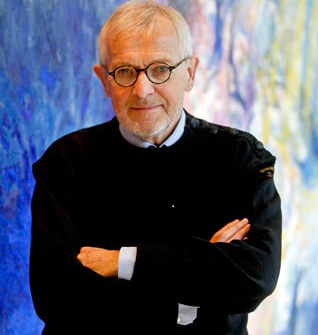Bethe Lecture focuses on ice telescope's discoveries
By Linda B. Glaser

IceCube, one of the world’s most unusual telescopes, has detected a flux of neutrinos reaching us from the cosmos, with energies more than a million times stronger than? those of the neutrinos produced at accelerator laboratories.
These neutrinos are astronomical messengers from the most violent processes in the universe, including giant black holes gobbling up stars in the heart of quasars and gamma-ray bursts, the biggest explosions since the Big Bang.
Principal Investigator Francis Halzen will discuss the IceCube Neutrino Observatory telescope – with sensors buried in 86 holes over 1.5 miles deep in the Antarctic icecap – and highlight its first scientific results as the 2016 Hans Bethe Lecturer in Physics in a public lecture, “Ice Fishing for Neutrinos.” The talk will be held Wednesday, March 23, at 7:30 p.m. in Schwartz Auditorium, Rockefeller Hall.
“The idea that you have to go to the South Pole and look down with a telescope made of ice in order to see neutrinos that are coming from the northern sky is mind blowing,” says Yuval Grossman, physics professor and event organizer. “These neutrinos let us see the universe in ways that were previously inconceivable. In a way it is like the discovery of x-rays that let us look inside a human body.”
Halzen is the Hilldale and Gregory Breit Professor at the University of Wisconsin, Madison, and director of the Institute for Elementary Particle Physics Research. The author of more than 700 papers, he received his master’s degree and doctorate from the University of Louvain, Belgium.
A fellow of the American Physical Society, Hazler’s honors include the Smithsonian American Ingenuity Award for Physical Sciences in 2014 and the Physics World Breakthrough of the Year Award for making the first observation of cosmic neutrinos in 2013.
As part of the Hans Bethe Lecture series, Halzen will also present the physics colloquium, “IceCube: The Discovery of High-Energy Cosmic Neutrinos?” Monday, March 21, at 4 p.m. in Schwartz Auditorium; and a Laboratory of Atomic and Solid State Physics seminar, “IceCube Neutrinos: From Oscillations to PeV Dark Matter," Tuesday, March 22, at 4 p.m. in 401 Physical Sciences Building.
The Hans Bethe Lectures, established by the Department of Physics and the College of Arts and Sciences, honor Bethe, Cornell professor of physics from 1936 until his death in 2005. Bethe won the Nobel Prize in physics in 1967 for his description of the nuclear processes that power the sun.
Linda B. Glaser is a writer for the College of Arts and Sciences.
Media Contact
Get Cornell news delivered right to your inbox.
Subscribe